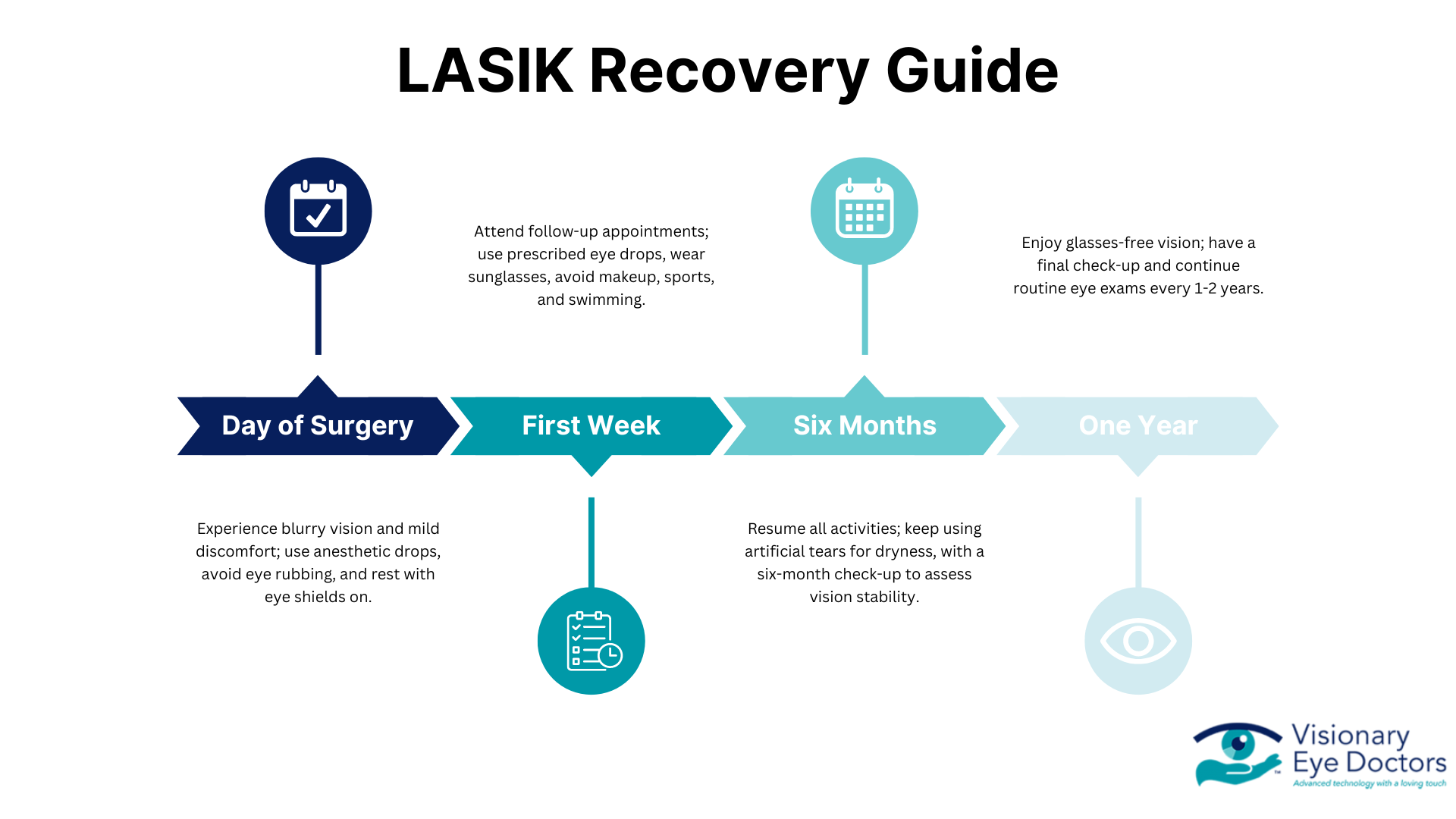LASIK Recovery Guide
LASIK (Laser-Assisted In Situ Keratomileusis) eye surgery is one of the most common elective surgical procedures in the United States. The procedure usually takes about 10 minutes, and you should see dramatically improved vision in just 12 to 24 hours! Still, your eyes may need up to six months to make a full recovery. Use this LASIK recovery guide so you know what to expect during each phase of the healing process.
What Happens During LASIK Eye Surgery

LASIK is a type of laser vision correction surgery that involves the use of a femtosecond laser to create a precise, thin flap in the cornea, the front part of the eye. This crucial step prepares the eye for the next phase of the procedure, where another laser reshapes the underlying corneal tissue. This reshaping corrects the eye’s focus by improving how light rays are directed onto the retina, enhancing your visual acuity. After the cornea is reshaped, the flap is replaced, healing naturally without stitches. This process significantly improves vision, offering a swift and effective solution for correcting refractive errors.
Immediately After LASIK
The recovery process from laser eye surgery begins right away. Slight swelling may occur, so you may notice foggy or blurry vision or halos around lights, especially at night. These side effects should improve as the swelling goes down within 24 hours, though minor haloing may linger for up to a month.
Other typical, temporary side effects may include:
- Mild stinging and redness
- Eye-watering or dry eye
- Gritty feeling in the eye
- Light sensitivity
In the first few hours after LASIK, use the anesthetic eyedrops your surgeon gives you to combat mild discomfort. Over-the-counter pain relievers can also help.
Then, even if you feel perfectly normal, follow these post-operative instructions:
- Get a ride home on LASIK treatment day.
- Refrain from rubbing your eyes, or you could displace the corneal flap and cause complications.
- Go to bed early on the day of your surgery to help your corneas begin healing.
- Wear the protective eye shields your surgeon gives you while you sleep.
The First Few Weeks After LASIK
Your first post-operative follow-up appointment will take place 24 hours after your laser eye surgery. A clinician will check the condition of your corneas and ensure everything looks right. You may have another appointment for a one-week post-op. However, contact your eye doctor immediately before your next checkup if you experience any pain, redness, discharge, or degraded vision.
Your vision should settle two to three months after LASIK. In the meantime, follow your doctor’s instructions about using antibiotic eye drops to guard against infection and steroid eye drops to reduce inflammation. You can also combat dryness with artificial tears.
Then, follow these precautions to further avoid injury and infection:
- Wear sunglasses always until your eyes no longer feel light-sensitive.
- Continue wearing your eye shields while you sleep.
- Continue to avoid rubbing your eyes.
- Avoid dusty environments and gardening for one week.
- Don’t wear eye makeup for a week.
- Avoid sports and exercise for the first week, and don’t play contact sports for at least a month.
- Keep water out of your eyes for a week and avoid swimming or hot tubs for at least a month.
One to Six Months After LASIK
You can resume all normal activities after a month, with the exception of some contact sports. Continue keeping your eyes lubricated with artificial tears, especially when working at a computer for long hours.
If you have a high prescription, your vision may take up to six months to settle. At your six-month appointment, your clinician will determine if your vision has reduced at all. While this is rare, re-treatment is easily performed if necessary.
One Year After LASIK
You’ve gotten used to the freedom of not wearing glasses and contact lenses by now, but you need one final follow-up at the one-year mark. At this point, you can expect to be discharged to the care of your local optometrist. Continue to schedule routine eye exams every one to two years to monitor your eye health and ensure clear vision for the foreseeable future!
How Does LASIK Recovery Time Compare to Other Vision Correction Surgeries
LASIK recovery time is generally shorter and more comfortable compared to other vision correction surgeries, such as photorefractive keratectomy (PRK). While LASIK patients often experience significant improvement in vision within 24 hours and can resume most regular activities within a day or two, PRK recovery is a bit more prolonged. In PRK, the outer layer of the cornea is completely removed to reshape the cornea beneath, requiring several days to a few weeks for this layer to heal and vision to stabilize. Consequently, PRK patients might face a longer period before they can return to their regular activities and experience full visual acuity. This makes LASIK a preferred option for many seeking a quicker return to normalcy post-surgery.
Schedule LASIK With Visionary Eye Doctors
Are you ready to achieve crystal-clear vision with LASIK? The first step is to schedule a consultation with an experienced eye surgeon at Visionary Eye Doctors. We can determine if you’re a candidate for LASIK and assess the overall health of your eyes to establish a long-term vision plan for you.
Meet Our Expert LASIK Surgeon
Dr. Daniel Sarezky, our Rockville office’s cornea expert and LASIK surgeon, brings an invaluable perspective to laser vision correction with his specialized focus on the cornea. His deep understanding of corneal health is crucial in providing exceptional postoperative care for LASIK patients. This expertise ensures that any potential issues are swiftly identified and managed, promoting a smoother recovery and optimal visual outcomes. Dr. Sarezky’s commitment to the latest in corneal treatment techniques offers patients not just advanced surgical options but also the reassurance of comprehensive care following their procedure.
To get started, please contact us online or call us at (301) 591-1763. We have offices in Rockville, MD; Damascus, MD; and Washington, DC, to better serve you.


